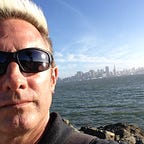Crabs and whales
A love story and a call to action
Editor’s Note: As California’s crab season ends with another blue whale entanglement, read this piece originally published in Contra Costa Times.
I love crab. I love ritualistically cracking each red-shelled appendage of a fresh, local Dungeness crab and extracting its sweet white meat, slowly savoring every last succulent morsel. As a native Californian, my relationship to Dungeness crab has been long and deep, and as an environmentalist who strives to be an ethical eater, I’ve felt pretty good about feeding from this relatively sustainable fishery — at least until recently.
Every November, I head to a local fish market right as the season opens, eager to indulge my epicurean passion. Dungeness crab is always on my Thanksgiving dinner table, a tradition for this native Californian going back to my childhood days of crabbing right off the pier in Morro Bay with my grandfather, back when these plentiful crustaceans didn’t even require a boat to catch.
But now my relationship to my favorite food has been complicated by the rapidly increasing number of whales that are becoming entangled in fishing lines along the West Coast, most of them connected to commercial crab traps. My beloved Thanksgiving crab has suddenly been sullied by passing humpback whales getting tangled by crab lines and facing death or dismemberment, complicating the simple pleasure of a crab claw glistening with drawn butter and bound for my mouth.
Yet it doesn’t need to be that way. There are some common-sense remedies that the crabbing industry can employ to minimize whale entanglements — including fewer and weaker lines in the water, giving the whales that do get entangled a chance to break free — and move California’s popular Dungeness crab fishery closer to sustainability.
Whale entanglements are the main problem preventing the Dungeness crab fishery from getting top marks from the respected Monterey Bay Aquarium Seafood Watch program, which notes the fishery’s consistent catch over 30 years and low habitat impacts. But hurting whales is a big problem that is only getting worse, with the federal government recording 30 entanglements along the West Coast last year, including 21 along California’s coast, up from an average of 10 a year over the previous decade.
This spring, I went to work as a media specialist in the oceans program at the Center for Biological Diversity, which requested and publicized the new federal data, giving me qualms about my taste for crabs. But I can clearly see a solution if the crabbers are willing to cooperate with regulators and conservation groups, a process that begins in earnest with a public hearing Thursday in Oakland.
Center attorney Kristen Monsell will be there advocating for a pilot program that includes allowing two traps per line, requiring electronic logbooks to better track gear, and trying weaker lines that could allow more than 70 percent of entangled whales to escape, according to a recent study.
I’ll also be following along, hoping the various sides can find a solution to the conflict between my favorite food and the plight of endangered whales that migrate along our coastline, before I need to decide whether to remove the Dungeness crab from my Thanksgiving plate.
Please, for the love of all that’s sweet and tasty, don’t make me do it.
Steven T. Jones is media specialist for the Oceans Program Center for Biological Diversity.
if you go What: The Ocean Protection Council, California Department of Fish and Wildlife and NOAA Fisheries will hold a meeting to present information on whale entanglements off the California coast and to develop strategies for reducing entanglements within the Dungeness crab fishery. When: Thursday, 8:30 a.m.-4:30 p.m. Where: Elihu M. Harris Building, conference room No. 1, 1515 Clay St., Oakland, between 15th and 16th streets.
Originally published at www.contracostatimes.com on August 19, 2015.
